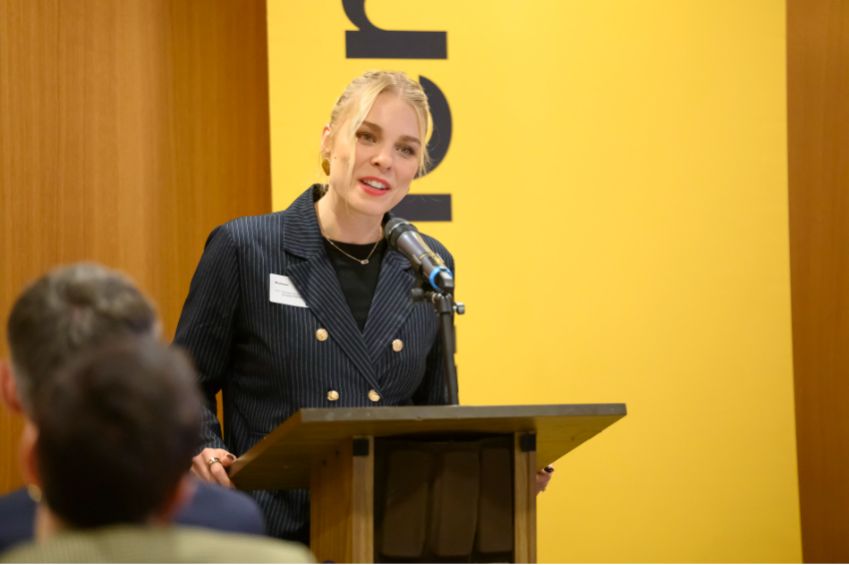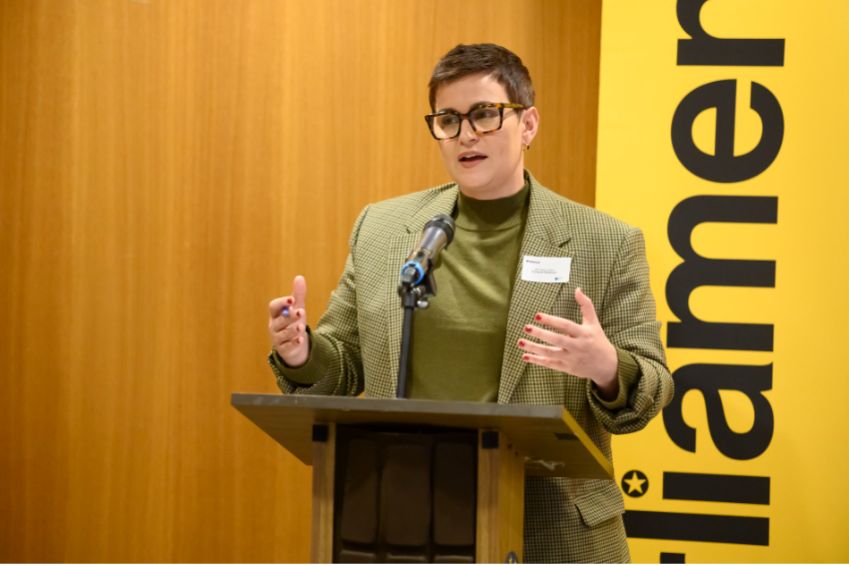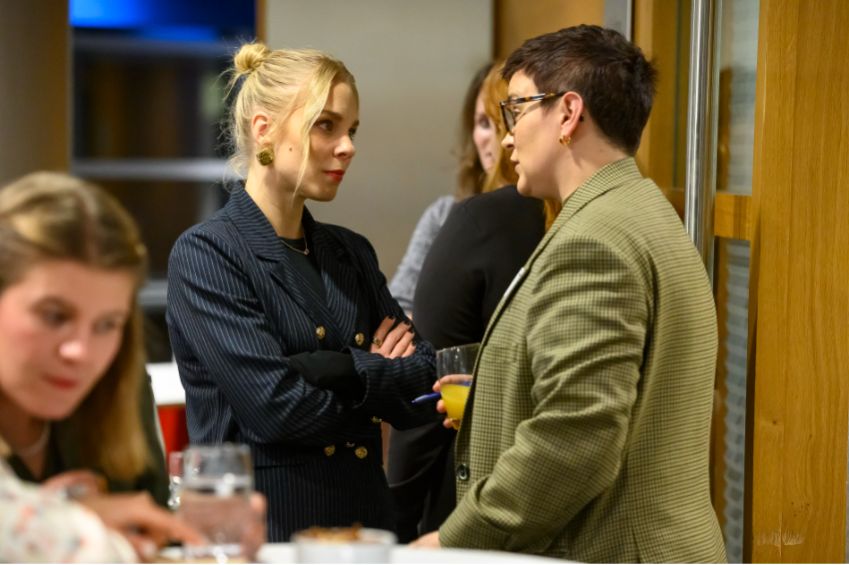The Parliament, in partnership with Besins Healthcare Germany, gathered EU decision-makers, clinicians and advocates at the European Parliament in Strasbourg to spotlight one of Europe’s most persistent public-health blind spots: menopause care. The event sought to move menopause out of the shadows and into EU policymaking, underlining the need for awareness, research and workplace inclusion as cornerstones of women’s health.
Opening the evening, MEP Veronika Cifrová (Renew Europe, Slovakia), co-host of the event, set the tone by calling for a long-overdue shift in mindset. “Menopause is not a niche topic – it is a natural stage of life that half of Europe’s population will experience,” she said.
 “Menopause is not a niche topic – it is a natural stage of life that half of Europe’s population will experience" - said MEP Veronika Cifrová (Renew Europe, Slovakia)
“Menopause is not a niche topic – it is a natural stage of life that half of Europe’s population will experience" - said MEP Veronika Cifrová (Renew Europe, Slovakia)
While the EU has made progress on gender equality, she warned that menopause remains too often overlooked in policy and public discourse. Silence, she noted, leads to stigma and late diagnosis, with women frequently leaving the workforce or facing discrimination at the height of their careers. “Awareness,” she concluded, “is the first step toward empowerment – and it must start here, in the Parliament.”
Building on her remarks, MEP Maria Walsh (EPP, Ireland), also co-host of the event, stressed that menopause should be treated as a public priority, not a private concern. “Every woman deserves access to accurate information, affordable treatment and understanding in her workplace,” she said.
“This is not about privilege – it is about equality.” Walsh highlighted persistent gaps in data collection and the lack of harmonised standards across Member States, urging the European Commission to work closely with national health authorities to improve access to therapies. “The cost of inaction,” she warned, “is counted in lost productivity, mental-health struggles and early exits from the labour market.” Her message was clear: Europe must normalise menopause through coordinated policies in health, research and employment.
We will work to embed menopause in ongoing EU initiatives, support medical education and encourage employers to adopt fair, flexible practices
As discussions turned to the scientific dimension, Dr Katrin Schaudig, President of the German Menopause Society, offered a compelling overview of the medical reality behind the stigma. “Up to 80% of women experience symptoms that affect their daily lives, yet fewer than one in three receive appropriate medical support,” she explained. She emphasised that inconsistent national guidelines and limited medical training often result in misdiagnosis or inadequate care, and called for EU-level initiatives to strengthen medical education and expand access to evidence-based therapies, including hormonal replacement treatments.
“We need to treat menopause as a health condition that deserves proper care, not as a taboo to be ignored,” she urged. Her remarks also drew attention to the urgent need for research on how menopause intersects with cardiovascular and mental health, suggesting that dedicated EU funding under Horizon Europe could help bridge these gaps.
 “Every woman deserves access to accurate information, affordable treatment and understanding in her workplace” said MEP Maria Walsh (EPP, Ireland)
“Every woman deserves access to accurate information, affordable treatment and understanding in her workplace” said MEP Maria Walsh (EPP, Ireland)
Linking the medical to the social, Prof. Dr Andrea Rumler, Vice-President of the Berlin School of Economics and Law, delivered the conclusion with a keynote speech that shifted the focus to workplace inclusion. “Menopause is not just a medical matter, it’s an equality issue,” she said. Women in their forties and fifties often occupy leadership positions, yet workplace cultures rarely accommodate their needs. Rumler cited research showing that symptoms such as fatigue and anxiety contribute significantly to absenteeism and career stagnation.
“Companies must understand that inclusion does not stop at maternity and must extend throughout a woman’s professional life,” she said, calling for concrete measures such as flexible schedules, awareness training and occupational health support. She urged EU institutions to encourage employers to adopt menopause policies within the framework of the Gender Equality Strategy, noting that “small steps can have a transformative effect.”
We have heard compelling evidence and lived experience tonight. The next step is delivery: better data, better access, and practical workplace support so women can thrive
As the formal speeches gave way to an open exchange, questions from attendees focused on three recurring concerns: uneven access to menopause care across Member States, the need for clear workplace policies, and better training for clinicians so symptoms are recognised and treated earlier. Participants also pressed for faster, clearer reimbursement pathways for evidence-based therapies and for stronger EU support to awareness campaigns that reach women before symptoms become debilitating. The panellists agreed that normalising the conversation is a prerequisite for all other progress.
Following on from the political commitments put forward during the preliminary discussions, representatives from two NGOs in Romania and Portugal defending the interests of menopausal women also emphasised the need for better coordination between the various national organisations dealing with this issue and promised to follow up on their discussions by organising visits to their respective countries in the near future.
 MEPs Maria Walsh and Veronika Cifrová have pledged to continue working towards a European strategy on menopause and to give this health issue the attention it deserves
MEPs Maria Walsh and Veronika Cifrová have pledged to continue working towards a European strategy on menopause and to give this health issue the attention it deserves
Bringing the evening to a close, MEP Maria Walsh underlined the importance of turning momentum into measurable outcomes. “We have heard compelling evidence and lived experience tonight. The next step is delivery: better data, better access, and practical workplace support so women can thrive,” she said, calling for closer coordination between the Commission, national health systems and employers to ensure consistency across the Union.
MEP Veronika Cifrová wrapped up with a commitment to keep menopause on the EU agenda. “This isn’t a side issue – it’s central to women’s health, equality and Europe’s productivity,” she noted. “We will work to embed menopause in ongoing EU initiatives, support medical education and encourage employers to adopt fair, flexible practices.” With thanks to the speakers and organisers, Both MEPs have pledged to continue working towards a European strategy on menopause and to give this European health issue the attention it deserves.
Join the conversation
The Parliament and Besins Healthcare Germany have partnered to host a series of policy-maker events to discuss and raise awareness of the issue.
To register and find out more about these events, email us at events@theparliamentmagazine.eu.
For more information on the menopause awareness campaign and background information, contact: dortiuslechner@besins-healthcare.com
Read MEPs Maria Walsh & Veronika Cifrová’s interview on how the EU and Member States can offer a better support to menopausal women.
Sign up to The Parliament's weekly newsletter
Every Friday our editorial team goes behind the headlines to offer insight and analysis on the key stories driving the EU agenda. Subscribe for free here.